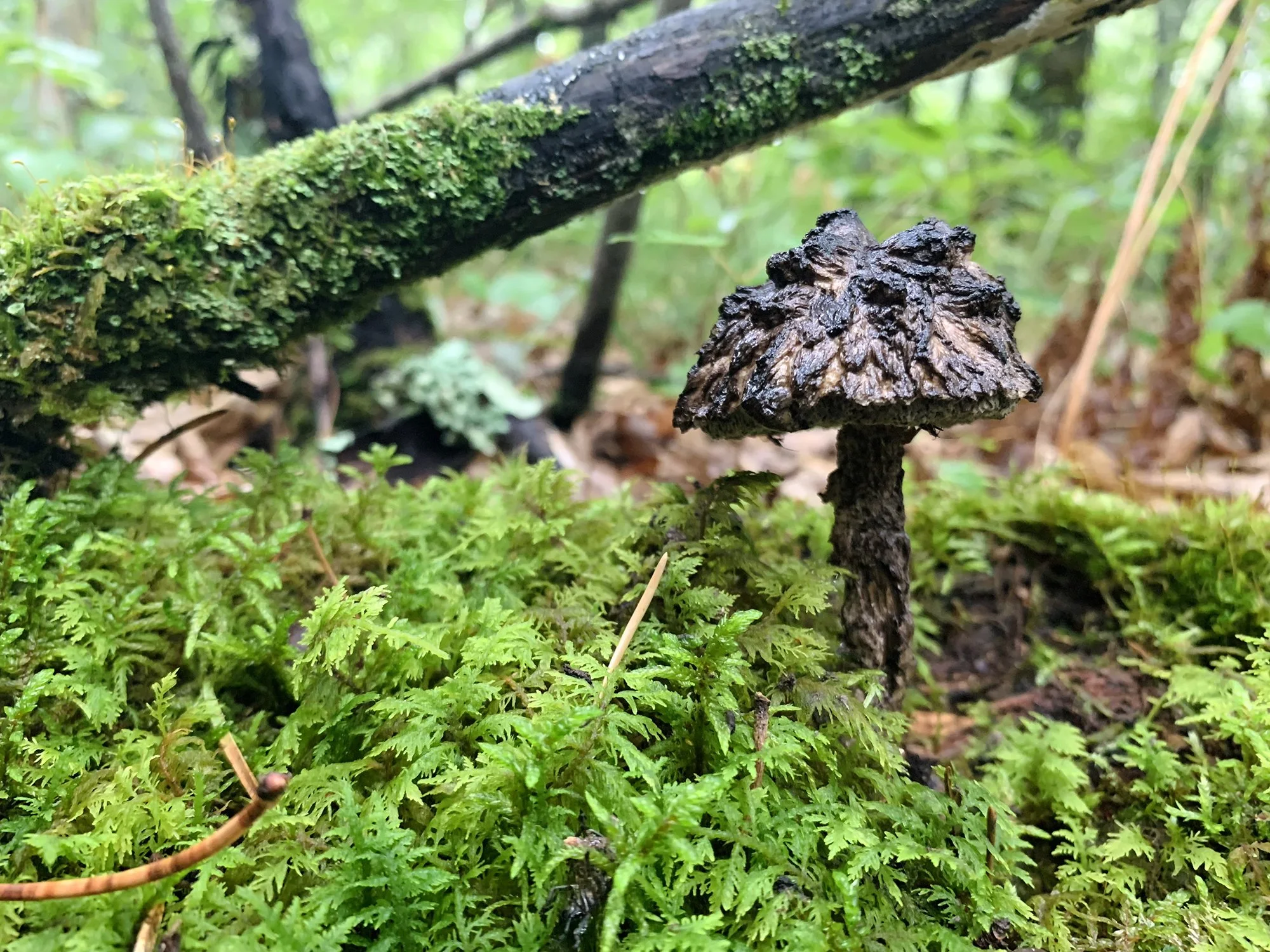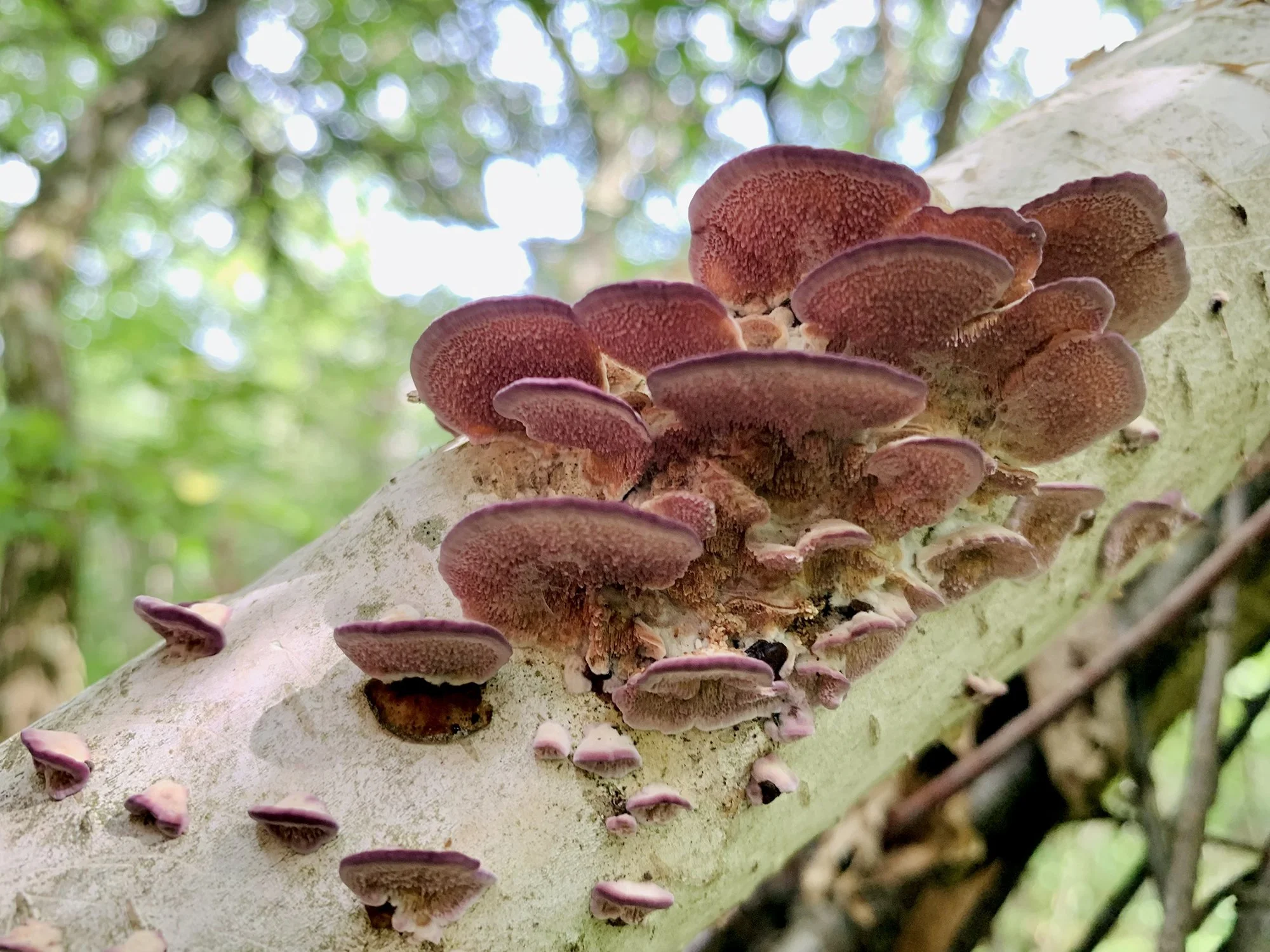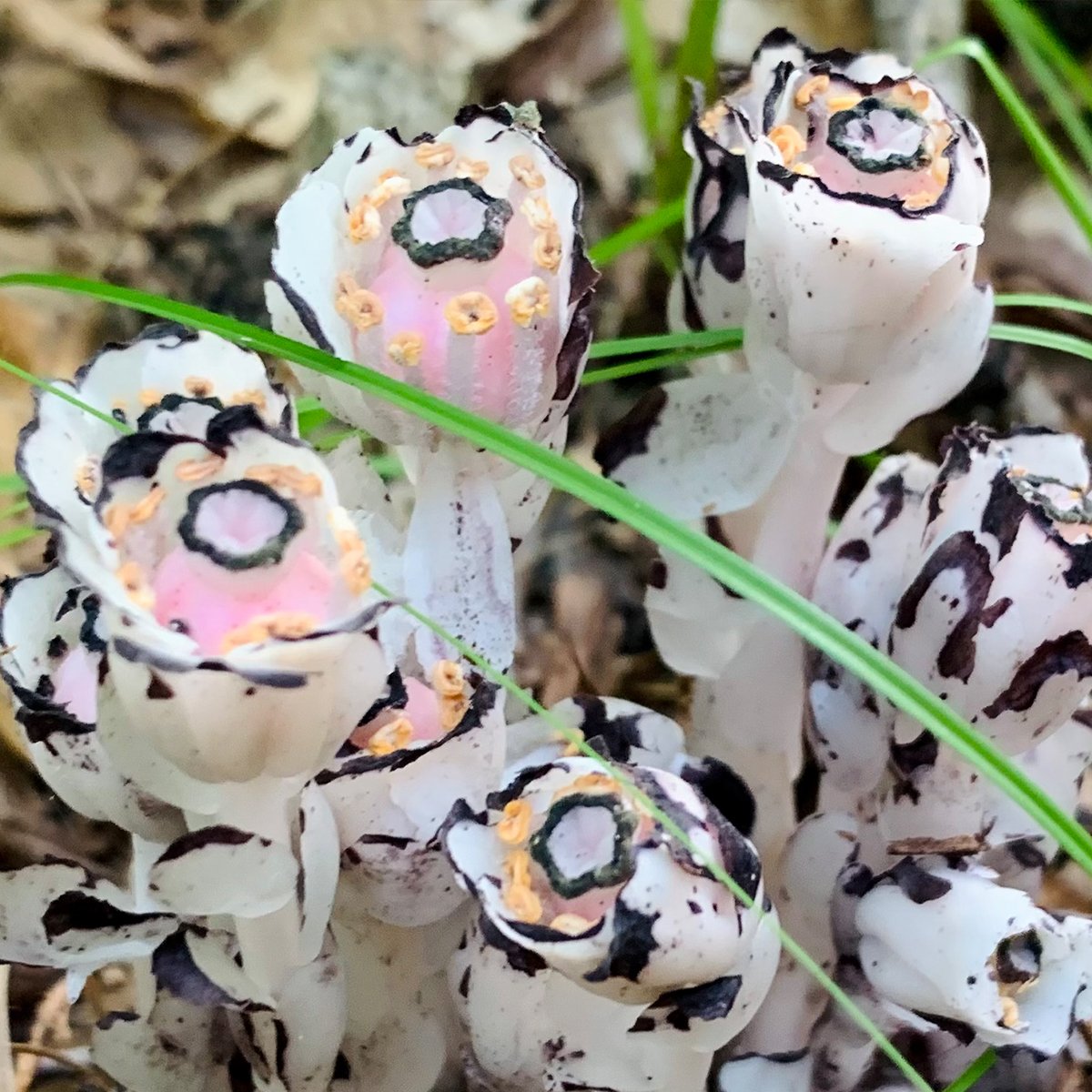
Timeline
A Studio In the Woods
The Slow Course of Knowing Place
This is a creative workspace in-the-making. The vision for the studio nurtures the practice of project-making and restorative creative development experiences.
In 2020, I began the journey of learning to become a steward for 5.5 acres of wooded land adjacent to a Wild and Scenic River. My dream of building a creative workspace in nature is slowly evolving, devolving, shifting, and being reimagined as challenges arise alongside the gift of knowing place. Getting to know this woodland generously informs the next phase of art-making and project collaboration. And it’s process is slow with fits of growth. Whatever happens next, this land is part of me now and I am part of it. We are inextricably in this moment together.
What’s Next
Winter/Spring, 2026: Rest.
The Land
First of all, this land is the traditional land of the Anishinabewaki / Očhéthi Šakówiŋ (Oglala Sioux) peoples. A surveyor told me that at some point in the past, this land may have been given away for free [to homesteaders] with a newspaper subscription. I have not yet discovered if that is true, but will continue to learn and write about obscured stories that relate to this place.
Aside from a few cabins on this short road, county forest surrounds the land to the north, south, and west. To the east, the land is situated next to National Park land, 300 feet from a Wild & Scenic River—the Namekagon.
In the late 1800s, the forest along this river was heavily logged. It may or may not have been part of Minong’s Five Mile Tower Fire of 1977. In 1980, this land was ablaze in the Oak Lake Fire, burning 11,418 acres of forest. This fire is memorialized with a gravestone at the nearest crossroad. In 2010, a derecho felled many big trees on the lot.
This land has weathered so much over the last 130 years, so it is a young forest. Just a few trees have persevered—one white pine and a sprinkling of red pines. It is full of white and red oak, maple, birch, and aspen, with lovely pockets of ironwood and cherry, here and there. Tall jack pine are plentiful, but their slender boles are quite unstable in the sandy soil. Many have fallen or are on the verge. Jack pine’s serotinous cones are resin-coated and the seeds inside may be viable for up to 20 years. They bloom in the fire, which explains their abundance here. I suppose the jack pine here are 45 years old. (2025)
The Wild & Scenic River
Protecting the health of free-flowing rivers was envisaged by Wisconsin Sen. Gaylord Nelson. Legislation for the Wild and Scenic River Act was introduced by Minnesota Sen. Walter Mondale (MN) in 1968. The St. Croix River and its tributary, the Namekagon River, are two of the original eight rivers listed under the Wild and Scenic Rivers Act.
Less than one quarter of 1% of American rivers are wild. The Namekagon River is beloved by many and was Gaylord’s inspiration for protecting wild rivers. Below is a photo from the first time I saw the river.
How It’s Going
Thoughtful Pauses & Big Steps Forward
Screen Doors, a Cedar Deck, & a Pair of Teak Folding Chairs
The land has no birthday. It’s always been here, or at least some form of it has. In 2020, I became an official partner with the land on October 16th, which happens to be the birth date of one of one of my favorite people on the planet, and 6 days after my own birthday. I quietly celebrate my connection with this place every year on that day. The fall colors light up and the land celebrates too. We started our journey together though in August, 2020. I was trudging through the dense, brushy tangle of its wild branches, no path, no sense of direction, just looking for the sun and red pines to guide me to its river. It was a young forest. It still is. But this year I am beginning to see a ripple that is about to lead to a sea change, I think. I’ve never watched a forest grow up, so I don’t know for sure what is about to happen, but it’s not as thick and hard to navigate as it was 5 years ago. There are little spaces opening up under the trees. The paths I’ve cut by hand with a pair of loppers over the years always grow back, but some paths are starting to keep the wear from my feet and whatever I am hauling back and forth between this place and that. The deer love to eat the young shoots and help me keep the shape of these spaces. We work together.
I’ve done very little creative work here so far, but I can sense this starting to shift too. Once or twice a year, Joseph, spends a day or two helping me with this endeavor, which seems impossible at times. Now there are screen doors and a deck attached to the shed—this little interim creative workspace that I have yet to use for making anything except to press a few flowers. I’m always working, bonding, dreaming, thinking, exploring, maintaining, setting up the tent, camping at the landing.
I have aspirations of spore prints from the fruiting bodies that emerge from the earth as summer gets on and the rain beckons them from whatever happens between the alchemy of the elements—calling them from underground threads into the vast empty space above. Someday, and hopefully soon, I will write, or make a magazine, or converge with other artists and we’ll create our own sea change. The screen doors and the deck make creative work here feel possible—protection from mosquitoes, hot sun, downpours, there’s a cross breeze, and a place to sit and ponder.
Grasses, fern, milkweed, and thistle have taken root in the bare dirt and now a tiny plot of prairie has emerged. This year, a hummingbird came to nest.
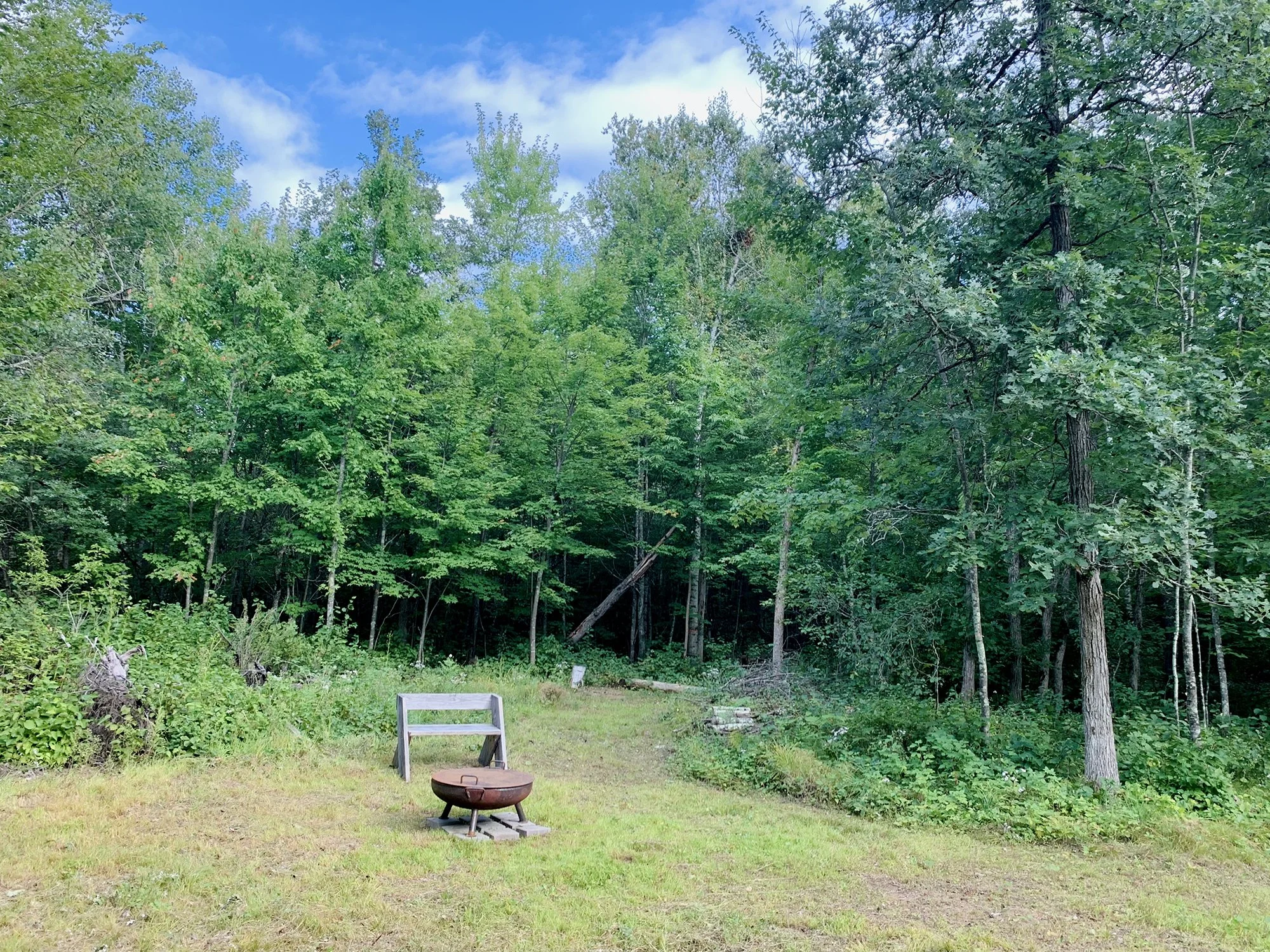
The place where you meet yourself.
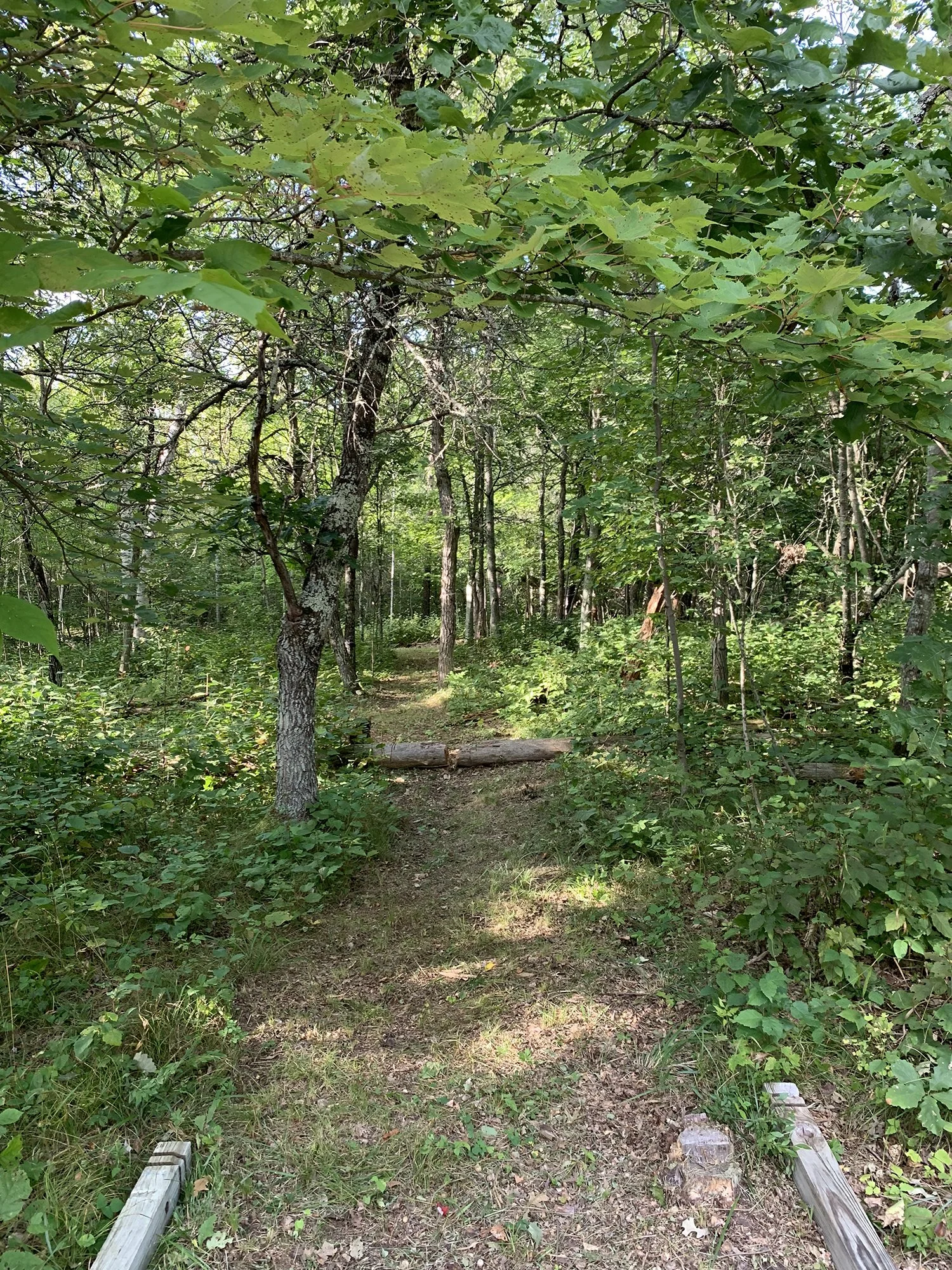
The north path.

The road to the land.
The Shed & Interim Creative Space
Every choice feels so significant (and so permanent). After visiting friends on the South Shore of Lake Superior, I was inspired to make some decisions. An 8’ x 16’ shed was installed September, 2023 and will serve as an interim studio/work space. Finally, a place to store a few things instead of tarping tables and hauling everything around in my car.
This step greatly improves my experience at the land as I prepare to gently shift into working on creative projects in nature while continuing to work with the land.
The larger studio will take a little longer, with a lot more planning (like everything in this process). Until then, say hello to this adorable shed!
The Compost Privy
The smaller shed is 8’ x 6’ and this will be the compost privy. The compost system is environmentally-friendly and easy to maintain. The permit is approved and the compost privy will be installed. Update: I purchased the SunMar Compost Toilet before the tariffs rolled out in Spring, 2025. It’s made in Canada. But, I just discovered a change in the zoning laws and now it is possible to keep an RV year-round without hauling into storage November through May. Options.
The Driveway
After two years of careful assessment, the driveway was installed. It flows into the forest like a river where the studio will be nestled in the woods in the company of oak, maple, and birch.
The driveway and clearing for the studio were discovered through the process of manual trail-making using a lopper and a pair of gloves, with occasional use of a small electric chainsaw.
Working with a tree expert who was a former forester, we worked together on a plan for preserving and removing trees. Bringing in larger equipment was not an easy choice, but special attention was given to a little grove of oaks that can die from too much weight on their roots. The trees along the cleared studio area and driveway grew larger in just the first few months.
The Ecoysystem
Every choice that alters nature effects the ecosystem. My intention for establishing this art studio is to generate as little harm as possible while considering wildlife habitat and tree and plant communities. My presence is disruptive, so my work includes patience and discovery while developing a relationship and deep connection with this place before making big decisions.
This regenerating forest supports important habitat— ruffed grouse, black bear, wolves, flying squirrels, owls, and ovenbirds. Both the ovenbird and ruffed grouse require unfragmented forest to thrive. Preserving expanses of woodland is an essential practice, especially as it borders NPS land that is also wild. This clubmoss patch is a place I protect from clearing because of its role in supporting habitat for ovenbirds and ruffed grouse. It’s also a fern ally. Yet, well-informed research cannot always anticipate what nature will do. So it’s not in the Clubmoss patch where I finally discovered the ruffed grouse nest, it was under a log 5 feet from the edge of the driveway.
Read my article The Ovenbird and the Wisdom of Wild Spaces, published in the Friends of the Wildflower Garden newsletter, The Fringed Gentian.
The Bench & Table
This was the first infrastructure at the land. Each trip I make to the land is full and meaningful. It is a 2-hour drive to get here and I drive back home at the end of the day, another 2 hours. During each visit, I contemplate what is offered here while walking the trails I’ve made. As I am working, I consider how to be a partner with the land in mutually-supportive ways. I work for 3 to 5 hours and find time to walk to the river or visit a nearby canoe landing.
For now, I don’t use the bench often, but I appreciate it! Before the bench and table, my backpack hung on broken tree limbs or rested in the grass where it would soon be covered in ticks. I parked in a ditch and ate lunch in the car. These two items, the bench and the table are modest and invaluable. I have a place to rest, eat a meal, and organize tools. Every once in a while, I make time to press flowers and leaves with a flower press gifted to me by a friend.
Milestones
Summer, 2025—Deck install on the shed.
Spring, 2025 — Compost toilet purchased.
Fall, 2024—Worked with neighbors to mitigate an oak wilt outbreak at the property line through a DNR grant. Shortly after, .61 acres was sold and the property line was redrawn to 5.5 acres.
September, 2023 — Moved two small sheds to the land. The 8 x 16 is an interim creative space and the 6 x 8 toolshed and future compost privy.
August, 2023 — Compost privy notarized and approved.
October, 2022 — First structure permit approved by the county for the shed.
October, 2022 — Studio plan approved by the National Park System lands program manager.
August, 2022 — Discovered Ghost Pipe near a grove of oaks where we will build a meditation deck.
June, 2022 — Completed Minnesota Master Naturalist training for Big Woods, Big Rivers.
June, 2022 — Studio site cleared, driveway installed.
2020-2021 — A year of deep contemplation. This first year, I got to know the plants, birds, wildflowers, and trees, and documented who made appearances in a nature journal.
October, 2020 — Purchased the 7.2 acre wooded lot in Northern Wisconsin and began the survey process. Acreage reduced to 6.11 acres to exclude the county road.
Scenes from the Woodland & River
Visual Diary
Coral Tipped Mushrooms
Glowing yellow mushroom
Black Footed Mushrooms
Old Man of the Woods
Reddish Russula
Mushrooms in the moss
Coral-Tipped Mushroom
Crimped Gill Musrooms
Crimped Gill Musrooms
Violet Toothed Polypore
Violet Toothed Polypore
Lobster Mushroom
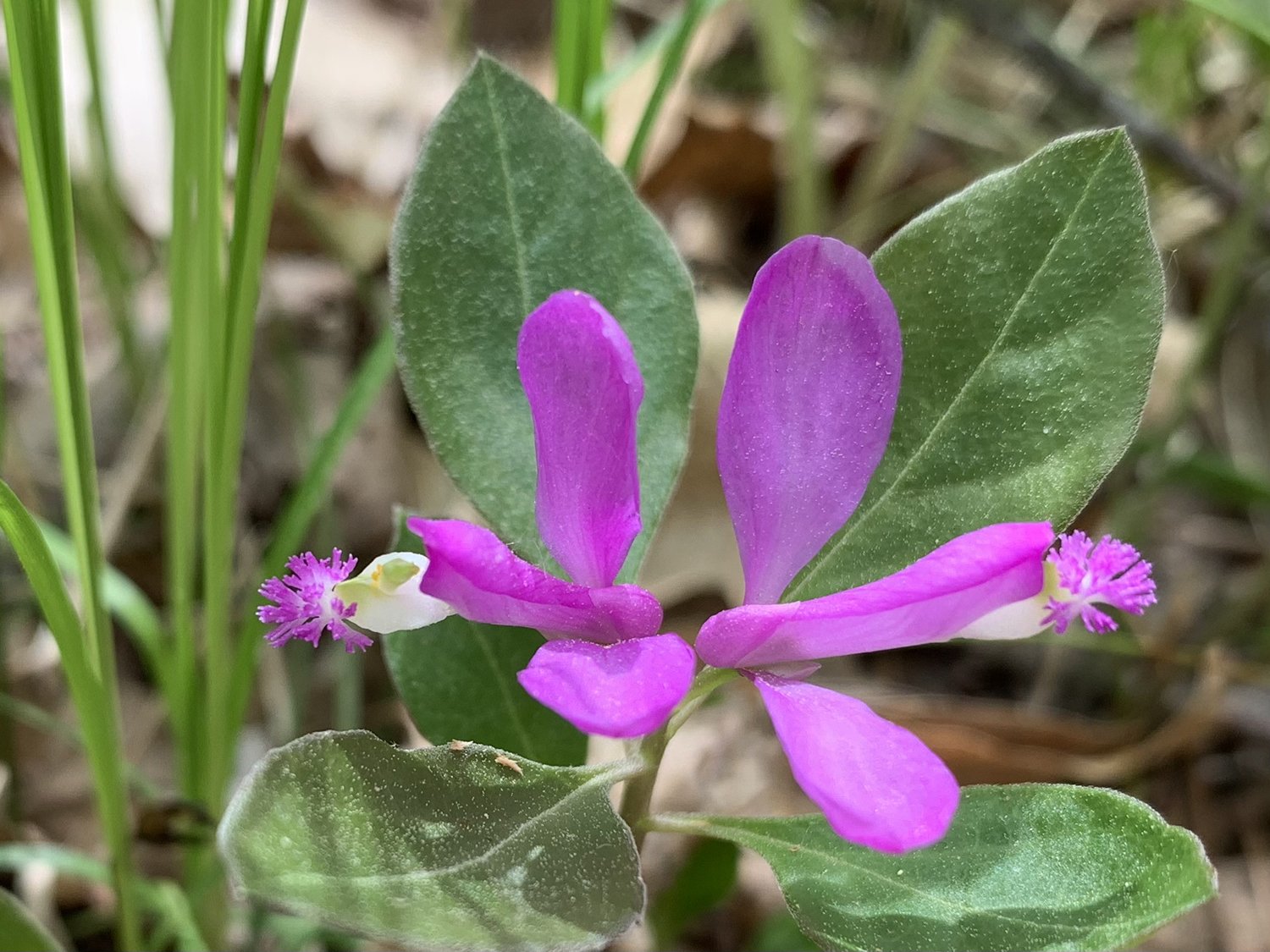
The road to the road of the land
The road
A stand of red pines at the top of a cliff along the Namekagon River
The Namekagon River in winter
The campfire area (cleared by hand with loppers over 3 years)
View from the future studio
A hand-cleared trail
The bench, table, and chemical-free bug net (surprisingly hard to find), near a hand-cut trail
Red Admiral Butterfly - 6/12/21
Black bear passing through - 7/16/21
Gray tree frog - 8/14/21
Gray tree frog, showing its amazing pattern - 8/29/21
Wolf or Coywolf - 9/22/21
Northern Flying Squirrel - 10/17/21
Pinwheel mushrooms!
Giant blue hyssop
Nodding triillium
Hepatica, my favorite spring ephemeral
Mystery mushroom
Clavaria
Ghost pipe
Earthstars
Bobcat - 2/7/23
Bobcat - 2/7/23
Crab Spider - 6/17/23
Leopard Frog - 8/12/23
Ruffed Grouse nest
Ghost pipe (south trail) - 8/22/23
Genus cimbex - 9/22/23
Nineman Road 2023
Fox squirrel?- December 23, 2024
Bobcat May 4, 2025
Bobcat May 4, 2025
Hairy Woodpecker - October 31, 2024















